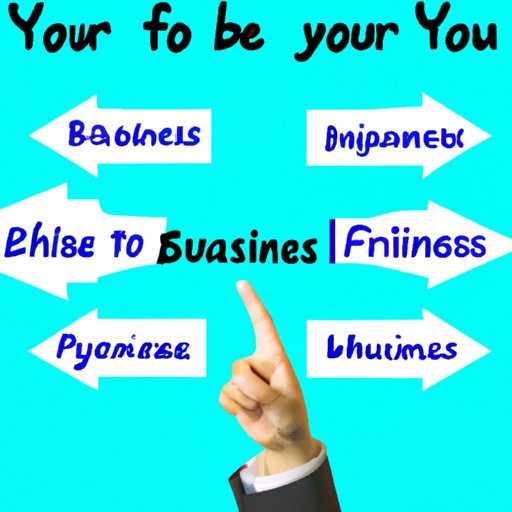Introduction
Starting a small business is a great way to achieve your financial and career goals. It can provide you with an opportunity to make an impact in the world and build something that is meaningful to you. However, it’s important to understand what is involved in starting a business before taking the plunge. This article will provide an overview of which business to start, list out some low-cost business ideas, explain how to choose the right business for you, outline the steps for starting a small business, explore the pros and cons of different business types, examine the tax implications of starting a business, and evaluate the financial requirements of starting a business.
List of Low-Cost Business Ideas
When considering which business to start, it’s important to consider low-cost options that require minimal startup capital. Here are some examples of businesses that can be started on a budget:
Freelancing
Freelancing is a great option for those who have specialized skills such as writing, design, web development, or programming. With freelancing, you can offer your services on platforms such as Upwork, Fiverr, and Freelancer.com and set your own rates. The best part about freelancing is that you don’t need to invest in any physical space or equipment to get started.
Consulting
If you have expertise and experience in a given field, you can offer consulting services. You can help companies or individuals solve problems, develop strategies, and improve processes. You can also offer virtual consulting services via video conferencing or phone calls.
Online Store
With the rise of ecommerce, it has become easier than ever to open an online store. There are numerous platforms such as Shopify, WooCommerce, and BigCommerce that allow you to quickly and easily create an online store. You can sell physical products, digital products, or a combination of both.
Dropshipping
Dropshipping is a type of ecommerce business model in which you don’t need to purchase inventory upfront. Instead, you partner with a dropshipping supplier who handles inventory management, fulfillment, and shipping. This means you don’t need to worry about managing inventory or dealing with customer returns.
Food Trucks
Food trucks are becoming increasingly popular due to their low overhead costs and ability to reach customers in different locations. If you have a passion for food, this could be a great option for you. You will need to obtain the necessary permits and licenses, as well as find a suitable location where you can park your truck.
Tutoring
If you have knowledge or experience in a particular area, you can offer tutoring services. You can tutor students in person or online and charge an hourly fee. This is a great option for those who want to share their knowledge and help others succeed.

How to Choose the Right Business for You
Choosing the right business for you is an important decision that should not be taken lightly. Here are some tips to help you make the right choice:
Assess Your Skills and Interests
Before starting a business, it’s important to assess your skills and interests. Evaluate what you are good at and what you enjoy doing. Doing something you are passionate about will make it easier and more enjoyable to run a successful business.
Consider Your Goals
Think about what you want to accomplish with your business. Do you want to make a living? Do you want to build an empire? Do you want to make a difference in the world? Knowing your goals will help you make the right choice.
Research Your Target Market
It’s important to research your target market before starting a business. Who are your potential customers? What do they need? How can you meet their needs? Answering these questions will help you determine if there is a market for your product or service.
Steps for Starting a Small Business
Once you’ve chosen the right business for you, there are several steps you need to take to get started. These include:
Write a Business Plan
A business plan is a document that outlines your business objectives and strategies. It should include an executive summary, description of your business, market analysis, competitive analysis, management team, financial projections, and more. Writing a business plan will help you organize your thoughts and stay focused on achieving your goals.
Register Your Business
You will need to register your business with the state in which you plan to operate. This process varies depending on the type of business you are starting, but typically involves filing paperwork with the Secretary of State and paying registration fees.
Obtain Necessary Licenses and Permits
Depending on the type of business you are starting, you may need to obtain certain licenses and permits. These can include health department permits, zoning permits, and licensing for certain professions. It’s important to research the requirements for your specific business.
Open a Business Bank Account
Opening a business bank account is essential for tracking expenses and income. This will also help you maintain accurate records and ensure that your personal and business finances are kept separate.
Establish Accounting Procedures
Having an effective accounting system in place is essential for any business. This will help you track your income and expenses, manage payroll, file taxes, and more. You can use software like QuickBooks or hire an accountant to handle your accounting needs.
Obtain Insurance
Insurance is essential for protecting your business from potential losses. Depending on the type of business you are starting, you may need to obtain general liability insurance, property insurance, and other types of coverage. Talk to an insurance agent to determine the best coverage for your business.
Exploring the Pros and Cons of Different Business Types
When starting a business, you will need to decide on the type of business entity. Here is an overview of the most common types of businesses:
Sole Proprietorship
A sole proprietorship is the most basic form of business ownership. It is owned by one individual and all profits and losses are reported on the owner’s personal tax return. The advantages of a sole proprietorship include ease of setup and control, but the disadvantages include unlimited personal liability.
Partnership
A partnership is a business owned by two or more individuals. All partners share profits and losses and have equal rights and responsibilities. The advantages of a partnership include shared resources and knowledge, but the disadvantages include potential conflict between partners.
Corporation
A corporation is a legal entity that is separate from its owners. It is owned by shareholders and managed by directors and officers. The advantages of a corporation include limited liability and increased credibility, but the disadvantages include complex setup and high cost.

Examining Tax Implications of Starting a Business
One of the most important considerations when starting a business is understanding the tax implications. Here is an overview of the federal and state/local taxes you may need to pay:
Federal Taxes
As a business owner, you may need to pay federal taxes such as self-employment tax, corporate income tax, and excise tax. You may also need to file estimated taxes, which are taxes paid throughout the year rather than at the end of the year.
State and Local Taxes
In addition to federal taxes, you may need to pay state and local taxes, such as sales tax, franchise tax, and property tax. Each state has its own tax laws, so it’s important to research the requirements for your specific state.

Evaluating the Financial Requirements of Starting a Business
Starting a business requires a significant amount of financial resources. Here is an overview of the financial requirements you may need to consider:
Startup Costs
Startup costs include one-time expenses such as legal fees, accounting fees, equipment, and office supplies. These costs can vary greatly depending on the type of business you are starting.
Working Capital
Working capital is the money needed to cover day-to-day expenses such as salaries, rent, and utilities. You will need to have sufficient working capital to keep your business running until it becomes profitable.
Conclusion
Starting a business can be a great way to achieve your financial and career goals. It’s important to take the time to research the different types of businesses and understand the financial and tax implications of starting a business. By following the steps outlined in this article, you can make the right choice and start a successful business.
(Note: Is this article not meeting your expectations? Do you have knowledge or insights to share? Unlock new opportunities and expand your reach by joining our authors team. Click Registration to join us and share your expertise with our readers.)
